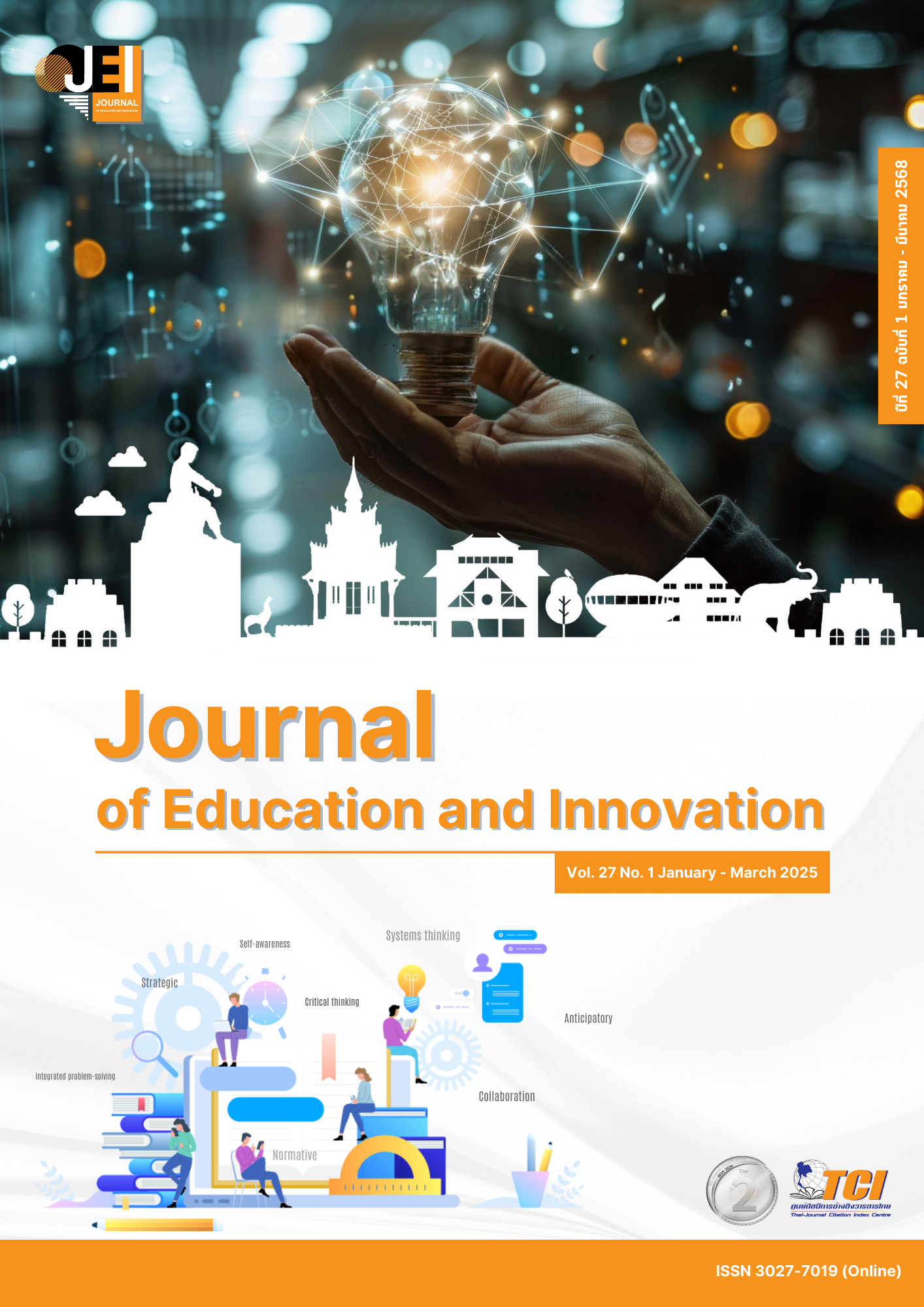DESIGN OF METAVERSE LEARNING ENVIRONMENTS TO ENHANCE ANALYTICAL THINKING FOR PRIMARY ONE LEVEL
Main Article Content
Abstract
This research was conducted to satisfy the following objectives: 1) To examine the results of learning environments created using the Metaverse, 2) To evaluate the analytical thinking capabilities of each student, 3) To examine the learning outcomes of the lessons, 4) To assess feedback from first-grade students at Khon Kaen University Demonstration School, Faculty of Education, comprising 38 individuals, during the first semester of the 2024 academic year. Instruments used in this research consist of learning environment design based on Metaverse’s available tools, an analytical thinking test and an academic achievement evaluation test. Qualitative data was analyzed using descriptive analysis, and the statistics used included percentages, means, and standard deviations. The results of this research are as follows; The Metaverse learning environment includes key components: Problems and missions, Learning resources, Foundational Scaffolding, Collaboration, and Coaching. Analytical thinking capability evaluation shows that 31 students (81.58%) achieved an average score of 11.50, equating to 76.66%. In term of learning results, 30 students (78.95%) achieved an average score of 15.63, equating to 76.30%. Students’ feedback indicates that the contents are appropriate and easy to understand. In term of design, a clear, readable, colorful, and engaging font has been included. The problem situations and learning tasks incorporated questions that stimulated analytical thinking and supported self-directed knowledge construction. Students were able to share and exchange their ideas. Lastly, different problem-solving situations enabled students to gain deeper understanding of the content.
Article Details

This work is licensed under a Creative Commons Attribution-NonCommercial-NoDerivatives 4.0 International License.
The owner of the article does not copy or violate any of its copyright. If any copyright infringement occurs or prosecution, in any case, the Editorial Board is not involved in all the rights to the owner of the article to be performed.
References
Ahmet, E. (2023). Metaverse/Meta-Education Belief Scale. Malaysian Online Journal of Educational Technology, 11(2), 94-107.
Benjamin S., & Bloom, B.S. (1956). Taxonomy of Educational Objectives the Classifition of Educational Goals. New York: David McKay.
Boonlue, S. (2022). Metaverse for education: the connection between the metaverse with the real world of learning to create immersive learning. Academic Journal of North Bangkok University, 11(1), 9-16.
Chaijaroen, S. (2007). The study of learners’ critical thinking potential, learning with innovation enhancing thinking potential (Research Report). Khon Kaen: Research Fund, Khon Kaen University.
Chaijaroen, S. (2014). Instructional design. Khon Kaen: Department of Educational Technology, Khon Kaen University.
Chaloemchatwanit, P. (2021). What is the Metaverse. Retrieved April 21, 2024, from https://thematter.co/futureverse/future-word-metaverse/161942
Hannafin, M. J. (1999). Open learning environments: Foundations, methods, and models. In Charles M. Reigeluth (Ed). Instructional design theories and models: A new paradigm of instructional theory: Volume II. London: Lowrence Erbaum Associate.
Herrington, J., & Oliver, R. (2000). An instructional design framework for authentic learning environments. Educational Technology Research and Development, 48(3), 23-48.
Intharapladecha, O. (2021). Metaverse Classroom, an online classroom of the virtual world. Retrieved April 21, 2024, from https://www.starfishlabz.com/blog/1055-metaverse-classroom-ห้องเรียนออนไลน์แห่งโลกเสมือน
Institute for the Promotion of Teaching Science and Technology. (2022). Metaverse. Retrieved June 3, 2024, from https://www.ipst.ac.th/knowledge/22565/metaverse.html
Kantaboon, K. (2022). Communication Model on Metaverse for Education at Communication Arts under Sukhothai Thammathirat Open University, Journal of Humanities & Social Sciences, 20(3), 123-144.
Kasetiam, N. (2022). Development of an Online Metaverse Lesson Using an Active Learning Approach Titled “Technology for Solving Problems” in Design and Technology Course of 9th Grade Students. Phitsanulok: Naresuan University.
Khon Kean University Demonstration Elementary School (Suksasart). (2023). Self-Assessment Report Year 2023. Khon Kean: Khon Kean university.
Kongsawat, P. (2023). Train analytical thinking skills to make learning easy for children. Retrieved May 5, 2024, from https://p-pac.com/?paipv=0&eav=AfYLjDQ1tP
Marini, A. (2022). Mobile Augmented Reality Learning Media with Metaverse to Improve Student Learning Outcomes in Science Class. International Journal of Interactive Mobile Technologies, 16(7), 99-115.
Mueansang, K. (2023). The Metaverse Classroom: Opportunities and Challenges for Thai Education. SSRU Journal of Management Science, 10(2), 10-17.
Na Songkhla, J. (2022). Metaverse: Transforming Education from Reality to a Decentralized Virtual Future. Retrieved May 1, 2024, from https://www.chula.ac.th/highlight/64690/
Phomson, P. (2017). The Development Web-Based Along the Constructivist Theory to Encourage Analytical Thinking Skill on Computer in Everyday Life of Matthayomsuksa 1 Students. Maha Sarakham: Mahasarakham University.
Piyanaraphiboon, K. (2023). E-learning Media through the Metaverse System to Develop Computational Skills of Students in Grades 1-3. Science and Technology to Community Journal, 1(1), 60-70.
Promsatien, Y., Nethanomsak, Y. (2021). Information Technology Really Improve Teaching and Learning? Khon Kean University Journals, 15(3), 1-13.
Reza, R. (2023). Elementary school teachers’ perceptions of the potential of metaverse technology as a transformation of interactive learning media in Indonesia. International Journal of Innovative Research and Scientific Studies, 6(1), 128-136.
Seng, R. (2023). The Development of Virtual Classroom with a Metaverse by Using Inquiry-based Process to Promote Competency-based Learning in Technology on Computing Science Course for Grade 6 Students of the Education Sandbox Schools. Yala: Yala Rajabhat University.
Wanpen, S. (2022). The Development of Analytical Thinking of Grade 6 Students by Using Constructivist and Graphic Organizer. Nakhon Pathom: Silpakorn University.
Wijitsupakan, W. (2022). The Development of Learning Management Based on Constructivist Theory together with social media in the Subjects of Social Study, Religions and Culture to Enhance Grade-One Students’ Critical Thinking in the Topic “Biography of Buddha”. College of Asian Scholars Journals, 12(2), 134-143.
World Economic Forum. (2020). Forecasts for Labour Market Evolution in 2020-2025. The Future of Jobs Report 2020. Retrieved from https://www3.weforum.org/docs/WEF_Future_of_Jobs_2020.pdf


